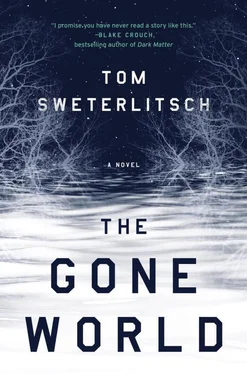Том Светерлич - The Gone World
Здесь есть возможность читать онлайн «Том Светерлич - The Gone World» весь текст электронной книги совершенно бесплатно (целиком полную версию без сокращений). В некоторых случаях можно слушать аудио, скачать через торрент в формате fb2 и присутствует краткое содержание. Город: New York, Год выпуска: 2018, ISBN: 2018, Издательство: G. P. Putnam's Sons, Жанр: Детективная фантастика, Триллер, на английском языке. Описание произведения, (предисловие) а так же отзывы посетителей доступны на портале библиотеки ЛибКат.
- Название:The Gone World
- Автор:
- Издательство:G. P. Putnam's Sons
- Жанр:
- Год:2018
- Город:New York
- ISBN:978-0-39916-750-8
- Рейтинг книги:5 / 5. Голосов: 1
-
Избранное:Добавить в избранное
- Отзывы:
-
Ваша оценка:
- 100
- 1
- 2
- 3
- 4
- 5
The Gone World: краткое содержание, описание и аннотация
Предлагаем к чтению аннотацию, описание, краткое содержание или предисловие (зависит от того, что написал сам автор книги «The Gone World»). Если вы не нашли необходимую информацию о книге — напишите в комментариях, мы постараемся отыскать её.
The Gone World — читать онлайн бесплатно полную книгу (весь текст) целиком
Ниже представлен текст книги, разбитый по страницам. Система сохранения места последней прочитанной страницы, позволяет с удобством читать онлайн бесплатно книгу «The Gone World», без необходимости каждый раз заново искать на чём Вы остановились. Поставьте закладку, и сможете в любой момент перейти на страницу, на которой закончили чтение.
Интервал:
Закладка:
Coming from the funeral home, Moss imagined that a version of herself had died and would be buried alongside Courtney. Despondent, isolated, uninterested in the new version of herself, the self who survived. She lived alone with her mother; her father had abandoned them when she was five. Friendly enough with her mother, but her mother was never around, either at work or at McGrogan’s for happy hours that melted into long nights of drinking. Moss grew inward, every night escaping to her room alone with her expanding collection of records: the Misfits, the Clash, the Sex Pistols, the Pixies, punk albums she picked from vinyl bins in CD stores—just lying in bed with her headphones in the dark, lost in soundscapes. Utterly wasted years, those remaining years of high school—drunk on Jack and Cherry Coke or whatever alcohol someone snuck in the parking lot at lunch. Vacant in her own skin, almost failing out of school but not quite—ready to just keep living at home if she had to, ready to work at the same telemarketing firm her mother worked for, but her track-and-field coach had taken notice, pulled some strings, secured a partial scholarship for Moss to attend WVU.
Three years after she lost Courtney, Moss was called to testify against her friend’s killer. She sat in the Washington County Courthouse wearing her mother’s work clothes, answering questions about the night her friend had died—Courtney’s parents listening to her testimony, Courtney’s mother weeping, Courtney’s killer listening unimpassioned. Moss never questioned her lack of empathy for the man who’d killed her best friend—a junkie, a vagrant. She’d wanted him to die, horrifically, or to serve life without parole, some sort of revenge, some sort of justice . She learned about the sentencing only later, the killer given twenty-eight years to life, but the sentence hadn’t seemed enough. Her rage at the idea that this man would live and might someday gain his freedom sliced through the fog of grief that had been suffocating her. The first semester of her sophomore year of college, drunken weekends and dorm-room dime bags gave way to coursework. She declared her major as criminology and investigation, secured an internship at the Washington County Coroner’s Office per her course requirements.
Intimidated by the internship at first, but the coroner’s office was an enjoyable way to spend an afternoon—the women there grateful for the help and eager to spoil her, chatting with her about birth control and music as she scuttled on her hands and knees reorganizing their filing cabinets. Dr. Radowski, the coroner, greeted her every morning but kept a cordial distance—an alcoholic, some of the clerks had told her, a homosexual, it was generally known, and while Radowski’s face was often glowing reddish when he arrived back from longer lunch hours, he was unfailingly kind. Some of her roommates had been appalled at the idea of what she was up to, squeamish at the thought of cadavers, but Moss readily scheduled classes around her internship and found she anticipated 12:20 every Thursday afternoon, when she would drive up 79 to Washington in her banana-yellow Pontiac Sunbird, to make it to the coroner’s office by one o’clock.
Nervous but not fearful the first time Radowski had allowed her to assist in an autopsy, dressed in a lab coat and goggles and gloves like a child playing scientist, standing only a few feet away as Radowski prepped the body, the decedent a sixty-four-year-old woman who’d been found only when the family in the adjacent apartment had called to complain about a smell. Moss’s first whiff of human putrefaction had taken root in her, a sickly-sweet pungency—but her curiosity made the leap over her disgust. The procedure had been surgical at times, scalpel slices and dissections, had been unexpectedly brutal when Radowski used hedge clippers to break through the rib cage and an industrial saw to cut through the skull, the sound a high-pitched squeal that powdered the room with dust. Radowski’s assistant had irrigated the woman’s viscera, running water through armfuls of colon in the sink, filling the room with the smell of feces—the same assistant cracked a joke when he found partially digested Twinkies in the woman’s stomach: “They would have lasted for eternity.”
Radowski allowed Moss to hold the woman’s heart. She cupped it in her gloved hands carefully, more like she was holding a bird with a broken wing rather than a dead muscle. Surprised by the heft of it, how much heavier a heart was than she would have imagined. Radowski had needed to scalpel through a protective sac in the cadaver’s chest to reach it, the pericardium, spilling fluid across the stainless-steel slab and onto the tile floor.
“Place the muscle here, please, so I can weigh it.”
Moss had done as Radowski instructed, setting the heart in a drip pan to drain.
“Take a look here,” Radowski said some time later, lifting an organ for her to see. “You’re looking at what amounts to the cause of death. The liver. Notice the deeper purple coloring, the texture like crushed charcoal. A healthy liver looks like a cut of meat you might pick up from the supermarket, pinkish and smooth. This is cirrhosis. She drank herself to death.”
Death is an unshared intimacy, Moss would sometimes think, finding a center of calm in the science of the morgue. Death and loss close company for her, her best friend dead, her father gone. The autopsy procedure helped bring closure to her experiences with mortality—death might still be a mystery, but the entirety of people’s lives could be summed up in file folders, in weights, in measurements.
Campus dorms in Morgantown, but summers she rented the upstairs unit of a Dormont duplex, commuting downtown to Pittsburgh to support herself. One of dozens in the secretarial pool at Buchanan Ingersoll, a law office in the USX Tower—her desk was cluttered with a boxy computer monitor and an electric typewriter, the steel shelves behind her a manila sea of alphabetized folders. A fashion plate back when she was twenty-one—military jackets with decorative epaulets, chunky gold earrings, glossy red lipstick, and leopard-patterned press-on nails. The older women called her “Madonna”—a compliment maybe. An hour every morning in the bathroom and several visits to the ladies’ room throughout the afternoon, teasing her hair, then blasting it with Aqua Net, fluffing her mane into puffed-out curls she gathered into a scrunchie. Coworkers gave her distance on smoke breaks, fearing her head might ignite.
Forensics and criminology textbooks during her lunches in Market Square. A waxed-paper basket of fried oysters and french fries on the afternoon she was approached by a man in a sports coat and a paisley tie. He took the chair opposite without bothering to ask permission to join her. He lifted the cover of her book, Introduction to Criminology: Theories, Methods and Criminal Behavior, 2nd Edition.
“Have you learned why men do what they do?” he asked.
Accustomed to businessmen and lawyers from Grant Street insinuating themselves into her company, men who thought downtown secretaries existed only to serve their pleasure, she’d been dismissive until the man showed his badge—NAVAL INVESTIGATIVE SERVICE, something she’d never heard of. Even then her first thought was that something had happened with her mother on one of her benders.
“We’re recruiting the best and the brightest,” he said.
Moss wondered what that had to do with her. “All right,” she said. “Yeah?”
He introduced himself as Special Agent O’Connor. “One of your professors put your name forward as a possible candidate for federal law enforcement,” he said. “She’s been impressed with your work.”
“Okay,” said Moss, wondering which professor, wondering if this was some sort of scam. “Don’t you have pamphlets to mail out or something?”
Читать дальшеИнтервал:
Закладка:
Похожие книги на «The Gone World»
Представляем Вашему вниманию похожие книги на «The Gone World» списком для выбора. Мы отобрали схожую по названию и смыслу литературу в надежде предоставить читателям больше вариантов отыскать новые, интересные, ещё непрочитанные произведения.
Обсуждение, отзывы о книге «The Gone World» и просто собственные мнения читателей. Оставьте ваши комментарии, напишите, что Вы думаете о произведении, его смысле или главных героях. Укажите что конкретно понравилось, а что нет, и почему Вы так считаете.




![Том Светерлич - Завтра вновь и вновь [litres]](/books/401288/tom-sveterlich-zavtra-vnov-i-vnov-litres-thumb.webp)
![Том Светерлич - Исчезнувший мир [litres]](/books/420722/tom-sveterlich-ischeznuvshij-mir-litres-thumb.webp)






